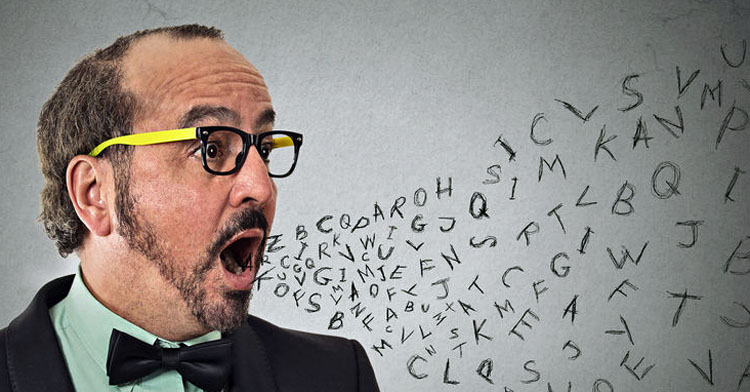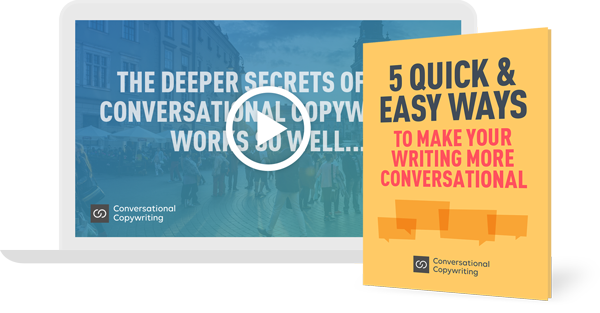
My first language is English.
But I live in Montreal, where the first language is French.
As a result, I’m used to translating French into English.
I’m not very good at it. But translating into English is something I do every day.
Now for the weirdness.
Sometimes, when I’m reading marketing copy or even business writing – in English – I have a moment of recognition in my mind.
I think, “Hang on, this feels like translating from a foreign language. I’m having to translate marketing language or business language into everyday English.”
Interesting notion… having to translate English into everyday English.
Not sure what I mean?
I’m a bit of a collector when it comes to finding marketing-speak that needs translating.
I’m aided and abetted by students of the Conversational Copywriting course. We share our latest finds on our Facebook page.
Here’s an example of the kind of stuff we come across.
Strangely, this is from the website of a digital advertising agency.
“…we work in agile, cross-functional teams, with our clients as partners and users as our focus to create memorable online experiences that instigate action.”
You have to sit back and translate it into regular language before you can truly understand the meaning.
I think what they’re trying to say is…
“We work together with our clients to create marketing that works”.
Why didn’t they say something like that? Why the fancy language that needs translating?
Here’s another one…
“To create a new era, new media solution embracing data, content and technology in an always on environment for global, multi-national, regional and local clients and millennial-driven digital brands.”
Wow… there’s a tough translation job.
I’m not even going to try. But if you want to give it a shot, share your translation as a comment below.
So… why write in a foreign language, with English words?
Honestly, I’m not even sure how people learned to write in such a weird and incomprehensible way. Were they taught this at school? At work?
I know that lawyers and politicians might sometimes choose to deliberately obscure meaning. They do this when they don’t want to be held accountable for something they say or write.
I get that. When it’s deliberate. For a purpose.
But when you’re a business owner or a marketer, where is the upside to writing in a way that makes it almost impossible to figure out what you mean?
Where’s the benefit to leaving your readers scratching their heads in confusion?
If you wouldn’t say it…
This is a pretty simple rule of thumb for you.
If you wouldn’t say it, don’t write it.
If it makes you sound like an idiot when you read it out loud, don’t write it.
If it sounds creepy or sleazy when you say it out loud, don’t write it.
And…
If you don’t even understand what you’re saying… if it feels like your own words need translating into everyday English… just stop.
Step back, grab your keyboard, and write another draft that’s easy to understand.
Write a version that is written in simple, everyday, conversational language.
No translation required.
NOTE: If you want your readers to understand what you’re saying instantly – without having to “translate” your sales copy first – find out more about the craft of Conversational Copywriting.

Hi Nick,
Enjoyed this post… thanks!
Jim.
I agree that the first copy block is horrid. The second example is from a prospectus and was likely written by lawyers, not copywriters. Nevertheless you would think that even lawyers could do better than that.
Hi Nick–
I’ve read several articles from B2B writers about the struggle with gobbledygook or jargon in copy. It’s as if the copy isn’t ‘serious’ if not presented with the stuff.
Since I’m a new writer in B2B, I see a new white paper in my future 🙂 I’d like to be able to make a case for clear, concise and conversational writing in B2B. Sure, you have to include some jargon, but not so the writing obscures clarity!
Here’s my shot at translation of “To create a new era, new media solution embracing data, content and technology in an always on environment for global, multi-national, regional and local clients and millennial-driven digital brands.” :
To create a 21st century media solution embracing relevant content for digital brands.
Love your posts, Nick.
I haven’t had any issues with getting clients to agree to conversational copywriting. What I have had, is a client that basically gave me keywords (and/or phrases) that weren’t proper English. Or told me to include Free and Cheap multiple times which makes a piece sounds almost….spammy?
I would love to see a post on your views/experiences with keywords and if you even bother with them for web writing.
Nick enjoyed your comments….you not only have to translate a foreign language, you must also think like a Frenchman & his culture.
Here is my shot at translating:
We create cutting-edge technology for the global ecosystem. Company size does not matter…..we have you covered.
I work in the technology sector, so I read jargon-laden writing all the time. It drives me nuts.
I’m just getting started in copywriting and would like to specialize in the technology sector. Forgive the question if it seems naive but… is it possible that this type of market-speak actually works better than plain English?
I see a multi-billion dollar companies (Hewlett-Packard) produce case studies that are weighed down with jargon and read at a grade 15 level when put through a readability analyzer.
I assume these case studies were written by professional writers and A/B tested in some way. Someone at HP making lots of money must have signed off on these documents. Can the marketing execs really be that clueless? Hopefully 🙂
Anyway, below are a few attempts at translating the example above.
We use the latest technology to market your products and services regardless of whether your firm is large, medium, or small.
We use the latest technology to help companies of all sizes market their products and services.
We help companies of all sizes use the latest technology to market their products and services.
We use the latest media techniques to help companies of all sizes market their products and services.
Chris, hi
Excellent translations!
As for whether there’s any advantage to writing at a grade 15 level, I can’t imagine there is, or ever was. I’ve asked people in the B2B field about this, and those who write B2B case studies, and they all roll their eyes and tell me they are in a constant struggle with clients over this. The clients are familiar with the technical gobbledygook, and feel safe with it, but are unable to provide any data that there’s an advantage to writing in a way that is barely comprehensible!
Great post! Thank you Nick. I love your blog and Conversational Copywriting. Since I’m not a native English speaker I can testify that CC approach creates a much wider audience in the world. That’s the future. Classic ads are dying. 75% of world companies are not recognized that yet. And don’t know the power of digital marketing. But will in a next decade for sure.
I’ll try to translate upper sentence… “We are creating modern media solutions for everyone.” If I understood it right…
That second one is so horrible, Nick! With some of them, you can kind of “get” what they’re saying. But with that one I just gave up. By the way, I’m loving the Conversational Copywriting course… Well done!
Hi Nick,
Here is my take on the three-line gibberish above:
“To create on-line marketing that works whatever your size or scope”
I’ve been trying to get clients and employers to lay off advertising hype for most of my thirty years of copy-writing. Now I’m retired, but it’s good to see that it finally starts to make sense at least to some of them.
I enjoy your every mail
Regards
Wille